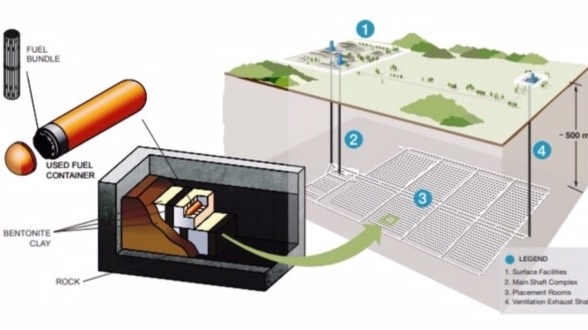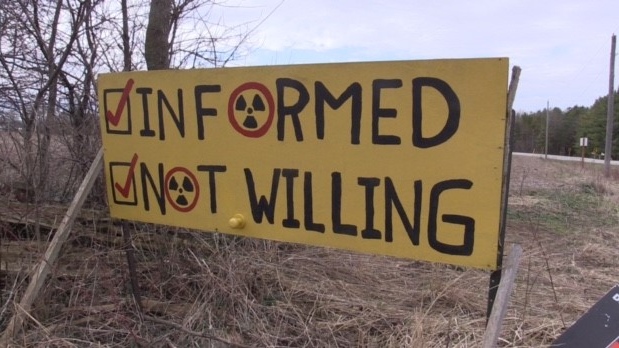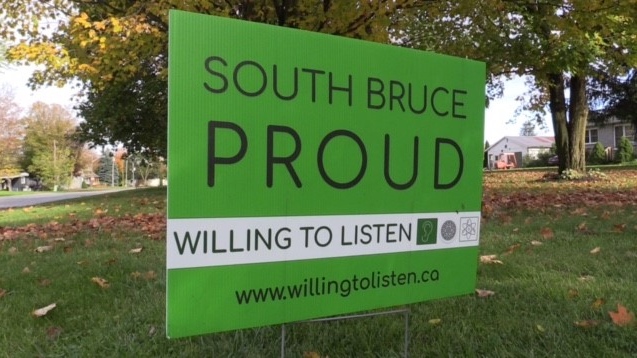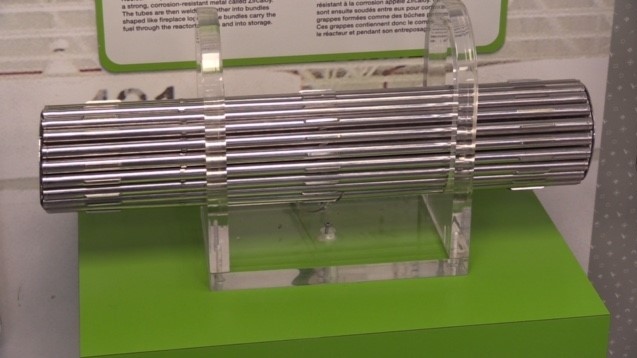Referendum question released in nuclear waste vote
It’s just a matter of months until the residents of South Bruce will head to the electronic ballot box to decide if they want to become the first community to permanently house Canada’s used nuclear fuel.
“Are you in favour of the Municipality of South Bruce declaring South Bruce to be a willing host for the Nuclear Waste Management Organization’s (NWMO) proposed deep geological repository?” will be the question posed to South Bruce residents this fall.
“It’s what I believe to be a clear and concise ‘Yes’ or ‘No’ question,” said Municipality of South Bruce Mayor Mark Goetz.
If more than 50 per cent of residents vote ‘Yes,’ South Bruce could host an underground facility housing over 5.6 million used nuclear fuel bundles that remain radioactive for centuries.
If less than 50 per cent of residents vote ‘Yes,’ South Bruce will remove itself as a potential host, according to Goetz.
If less than 50 per cent of South Bruce residents vote in the referendum, expected to happen this September or October, South Bruce council will decide the community’s fate.
 The proposed design of a Deep Geological Repository to store Canada’s used nuclear fuel. (Source: Nuclear Waste Management Organization)
The proposed design of a Deep Geological Repository to store Canada’s used nuclear fuel. (Source: Nuclear Waste Management Organization)
Historically, voter turnout in South Bruce municipal elections, and most municipal elections in Ontario, hovers between 30 and 40 per cent.
However, last election, largely due to interest in the proposed nuclear waste project, voter turnout nearly reached 60 per cent in South Bruce, so Mayor Goetz does not expect council will be forced to make this decision.
“In the last election here in South Bruce, we reached 59.33 per cent voter turnout, which was 23 per cent higher than the provincial average. We need that strong 50 per cent in order for the referendum to pass,” said Goetz.
Opponents of the project, who have covered the proposed project area with yellow signs, have no problem with the question or impending referendum, but do question the manner in which residents will vote.
 Sign opposing plans to build a facility to house Canada’s used nuclear fuel near Teeswater, seen on April 4, 2024. (Scott Miller/CTV News London)
Sign opposing plans to build a facility to house Canada’s used nuclear fuel near Teeswater, seen on April 4, 2024. (Scott Miller/CTV News London)
They want a paper ballot, not the online format which council has decided upon.
“There’s so much riding on this election, and it’s a forever vote for our community. So, I really feel that there needs to be a verifiable, tamper-proof election. Paper ballots, at the end of the day, the physical proof is right there for everybody on both sides to see,” said Michelle Stein, a farmer who lives within the proposed project site and co-founder of No Nuclear Waste-Protect our Waterways.
Goetz said despite an incomplete hosting agreement with the NWMO, which will lay out how much the municipality will be paid to host Canada’s high level nuclear waste in perpetuity, the community should be heading to the polls this fall, answering the biggest question to ever face the community of 5,880 residents.
 ‘Willing to Listen’ lawn sign in Teeswater, seen in August 2022. (Scott Miller/CTV News London)
‘Willing to Listen’ lawn sign in Teeswater, seen in August 2022. (Scott Miller/CTV News London)
“I’m hopeful residents will take the time to cast their ballots on the project, whether they are in favour of it or not,” said Goetz.
Members of the Saugeen Ojibway Nation, whose territory the project falls within, must also decide if they are “willing hosts” before the project can move forward.
The Northern Ontario community of Ignace is the only other community in the running to host the $26 billion project.
NWMO said they will decide which community will host the project by the end of this year.
 Example of a used nuclear fuel bundle, seen in 2018. (Scott Miller/CTV News London)
Example of a used nuclear fuel bundle, seen in 2018. (Scott Miller/CTV News London)
CTVNews.ca Top Stories

Liberal MP says she's leaving politics over disrespectful dialogue, threats, misogyny
Liberal MP Pam Damoff says she won't run again in the next federal election, saying she has experienced misogyny, disrespectful dialogue in politics and threats to her life.
Concerns about Plexiglass prompt inspections at some Loblaws locations in Ottawa
Inspections are underway at more than one Loblaws location in Ottawa after complaints were filed about tall Plexiglass barriers.
Federal employees will be required to spend 3 days a week in the office
Starting in September, public servants in the core public administration will be required to work in the office a minimum of three days a week. The Treasury Board Secretariat says executives will need to be in the office four days per week.
OPP officer said 'someone's going to get hurt' before wrong-way Hwy. 401 crash
As multiple Durham police cruisers were chasing a robbery suspect on the wrong side of Highway 401 Monday night, an Ontario Provincial Police officer shared his concerns, telling a dispatcher, "Someone's going to get hurt."
Ont. woman who faked pregnancy to defraud doulas arrested again on similar charges
Victims of a Brantford, Ont., woman who was sentenced to house arrest earlier this year for defrauding and deceiving doulas say they’re not surprised she’s been apprehended again on similar charges.
Five human skeletons, missing hands and feet, found outside house of Nazi leader Hermann Göring
Archeologists have unearthed the skeletons of five people, missing their hands and feet, at a former Nazi military base in Poland.
Poilievre returns to House unrepentant for calling Trudeau 'wacko,' Speaker not resigning
An unrepentant Pierre Poilievre returned to the House of Commons on Wednesday to pepper the prime minister about his drug decriminalization policies after being booted the day prior for refusing to take back calling Justin Trudeau 'wacko' over his approach to the issue.
Construction begins on LGBTQ2S+ national monument in Ottawa
Shovels have hit the ground for constuction on Canada's LGBTQ2S+ national monument in Ottawa.
B.C. man awarded $5,000 in damages in first-of-it-kind intimate image case
In a first-of-its-kind case, a B.C. tribunal has ruled on a dispute involving the non-consensual sharing of intimate images, awarding damages and issuing orders that the photos be destroyed and taken offline.

































